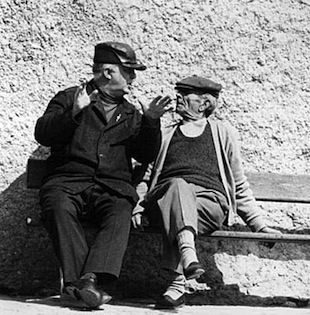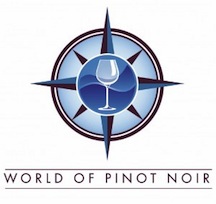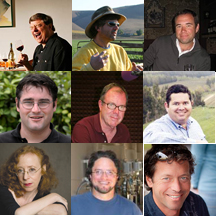Talking Natural Wine: A Real Discussion
 What is the meaning of the "Natural Wine" movement? Why is here with us and why now? How has it slipped up? What kind of opposition does it face? How much support does it have?
What is the meaning of the "Natural Wine" movement? Why is here with us and why now? How has it slipped up? What kind of opposition does it face? How much support does it have?
These are the questions I've been pondering recently as I prepare to go down to World of Pinot Noir this weekend to attend that annual festival of all things Pinot Noir and, in particular, listen to a debate/discussion about Natural Wines.
What I'm hoping for is a robust discussion of the movement itself. What I hope not to hear is a criticism of the wines. I start with this hope due the fact that in my reading and research I've come across a number of people that have criticized the entire category of wines on the basis of some in the movement who profess to use no S02 in their wines. In fact, for many the very definition of "Natural Wines" seems to be "They use no sulfur!" This kind of observation is often followed by noting that the wines are often flawed, yellowed, oxidized, don't travel well, etc., etc.
Criticizing so-called "natural wines" on this basis seems to me akin to criticizing all California wine on the basis that they are often aged in oak. Whether to use S02 or not is a winemaking decision and a legitimate one at that. Those who choose to omit its use are making at least an aesthetic decision and perhaps an ethical decision. Either way, criticizing these wines on that basis seems petty and too academic. My hope is that while this technique (or anti-technique) might find mention at the World of Pinot seminar, it won't be the focus of the conversation by the winemakers and experts brought together to discuss the topic.
I've mentioned in other posts that I see this new category of wines as a fascinating combination of  anti-globalism, the recent embrace of paganist philosophy, rolled up in a Rachel Carsonesque cri de coeur. To me it is fascinating how a winemaking movement can be motivated by this kind of stew of global cultural and ethical issues. I hope this is discussed in Pismo Beach.
anti-globalism, the recent embrace of paganist philosophy, rolled up in a Rachel Carsonesque cri de coeur. To me it is fascinating how a winemaking movement can be motivated by this kind of stew of global cultural and ethical issues. I hope this is discussed in Pismo Beach.
I've also criticized this movement on the grounds that its champions have a tendency to use "Denigration Marketing" as a means of promoting the wines. By this I mean too often all wines not dubbed "natural" are categorized under the "industrial" or "unauthentic" category. I see no push back among the winemakers involved in the movement and this is too bad because I can't help but believe they are equally tainted by this kind of unethical marketing and promotional tactic.
What seems rarely discussed in "natural" wine circles is that the entire body of minimalist techniques used by its winemakers were developed and championed by winemakers the world over who would today never be admitted into the circle of winemakers now trying to identify themselves as mavericks for utilizing the same techniques that so-called "Industrial" winemakers have been pushing for decades.
The idea that a light hand in the vineyard and cellar produces the most "authentic" wines is one that New World winemakers have been talking about for a very long time. The notion that a wine is more interesting if it can more accurately reflect the terroir of its birth is also a notion that winemakers now dubbed "industrialists" have been chanpioning for a very long time.
"Natural Wine" isn't new, but rather an amalgamatory approach to winemaking. My hope is the panelists at World of Pinot will also address this curious turn that many in the movement have latched on to.
Finally, I've been a critic of the very name "Natural Wine". As we all know there is no definition of "Natural Wine". It is treated by most as we treat pornography: you know it when you see it. Yet the clear implication is that if these wines are "Natural", then all others are "unNatural". This mistaken identity is, I believe, embraced by too many champions of the genre because they know that in a world where "natural" is good, it's likely that uninformed consumers will assume their wines are better to drink while those outside the category may be damaging to their health or the health of the planet. This is an insidious attitude and cynical ploy.
Fresh squeezed orange juice is natural. Milk from a cow's udder is natural. Wine is processed, no matter how little sulfur is used, no matter how little help the fermentation gets in the cellar and no matter how little is added to the soils in which the vines are grown.
I hope this delicate issue might be addressed by those panelists how are bravely taking on this issue at World of Pinot Noir. Nomenclature is important for the simple reason that words convey critical meanings that can both aide and detract from the subjects they are addressing and to date, the term "Natural Wine" does little more than confuse, degrade and imply a meaning that does not exist.
 The panel on Natural Wine at the World of Pinot Noir will consist of an interest crew of wine professionals including Bradley Brown (Big Basin Vineyards), Peter Cargasacchi (Cargasacchi Wines), Alice Feiring (author, Naked Wine), Nathan Kandler (Thomas Fogarty Winery), Scott Kelley (Estancia Winery), Brian Maloney (DeLoach VIneyards), Clark Smith (Wine Smith Wines) and Joe Wright (Left Coast Cellars). John Haeger, author and Pinot expert, will moderate the panel.
The panel on Natural Wine at the World of Pinot Noir will consist of an interest crew of wine professionals including Bradley Brown (Big Basin Vineyards), Peter Cargasacchi (Cargasacchi Wines), Alice Feiring (author, Naked Wine), Nathan Kandler (Thomas Fogarty Winery), Scott Kelley (Estancia Winery), Brian Maloney (DeLoach VIneyards), Clark Smith (Wine Smith Wines) and Joe Wright (Left Coast Cellars). John Haeger, author and Pinot expert, will moderate the panel.
Controversy seems to follow around the "natural wine" movement. Most recently the uproar has been about the fact that London saw two competing Natural Wine Fairs hold their events on the same day, a result of the two organizers of last year's fair splitting over ideological differences. This kind of controversy will work itself out. However, the problems with the movement that I note above and the tendency to write off natural wines on aesthetic grounds are areas where debate will continue. The debates that swirl around this movement are not the kind that are interesting to a small group of wine lovers or wine insiders and have little impact other than to arrest our intellect. Rather the outcome these particular debates will have consequences. And that, I believe, is why these issues are being debated so vociferously on and off the Internet and at places like World of Pinot Noir.

*udder
Since we seem to be hung-up on defining categories, would anyone like to define “industrial” or “conventional” wine for me? I don’t remember a definitive definition of this wine category.
It is Natural wine made with some help from humans, machines and some Organic matter such as SO2, hopefully just enough to protect it from harm.
I think it’s kind of cute that there are parts of California where they have the time and energy to worry about this…
Frankly, if sulfur is considered unnatural, then maybe cooperage should be considered too technological as well. Perhaps we should also skip pressing and bottling and just eat fermenting berries right off the vine. Now THAT’S natural!
I tried my first 2 natural wines this week, a southern French red and a white, and I was quite disappointed. The white was 2011 but seemed much older, the red was passable. The both had rather hefty pricetags. Am I missing something?
Tom,
Disappointed a bit that you keep harping on this issue. “Natural wine” is a crowd sourced term; one that just happened. Wine marketing/PR people are perhaps taking advantage of it- while there is plenty of “green washing”; it just describes a method that in general is understood. It’s not the best term; agreed, but still – its very out there at this point. Neither you nor I can do much about that.
Many of the wines are good, but by no means all. As this is exactly the case with ‘regular wines’ I don’t see any issues there. I can define industrial wine (which does not take away from artisan producers who are not working ‘naturally’) if you want.
Your feeling, and insistence that ‘natural’ implies that other wines are not is not in tune with reality at the retail level, we have plenty of customers who regularly by ‘natural’ and other types of wine.
Finally, some wines in my opinion are not natural despite claims- some of the sulfur free bottles are not organic, use creative (cultured and lab created) yeasts, and chemical processes to remove the sulfites that occur as part of fermentation. These wines are not ‘natural’, and in my world prove ‘green washing’. Plus they don’t really taste all that good to me.
Some thoughts,
B.
This is America, and we all believe in freedom of choice. While the “Natural” moniker is somewhat dubious let’s not forget that wave is in the wake of the “Clean” food movement. As a former cancer patient I take what I put into my body more seriously these days than in my younger days. The fact of the matter is, once you clean up your mind, body and soul, the palate changes, awareness changes. Consequently, I find myself bored with the juggernaut of wines Parker deems fabulous. I have a whole cellar of them and find myself with absolutely no desire to drink them. Like Eric Clapton I find myself “Hard to Thrill”. I dare anyone to drink a Loire white or a Fouillard Morgon and tell me they haven’t had their heads turned around. The added benefit of no sulfur is most of these fit into the whole “Locavore” mindset. So let’s chill out and remember life is a journey not a race. Wine is a business, but some would rather make art.
there are vines on the mountain i live on. my neighbor has the same plant material i do. he has a beautiful vineyard and he produces excellent fruit. i taste it after it is fermented dry. it’s exquisite and though only a half mile from mine the result from his grenache and mourvedre is different. a different slope of the mountain and a bit less decomposed granite. then he takes that juice and puts it in new oak barrels. and there the ability to compare very nearly ends. because it can still be compared to the supermarket wines.
Yes, time to move past on the semantic definition of the word ‘natural’! Surely it’s all been said by now? I think we all know that it’s not the best possible word to use, but it’s the one being used. Why don’t we make a list of all the other words in English that don’t describe what they’re supposed to describe? 🙂
So do you have a report of how the panel session went, assuming you attended?
Just continue, taste more …
The post is actually the freshest on this laudable subject. I harmonize with your conclusions and will thirstily look forward to see your approaching updates.